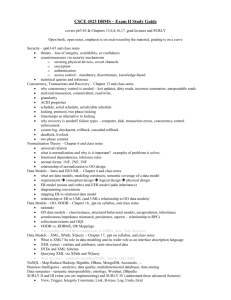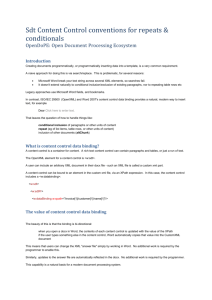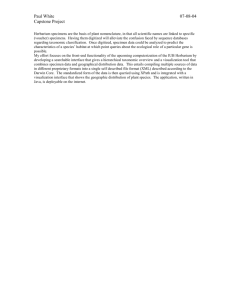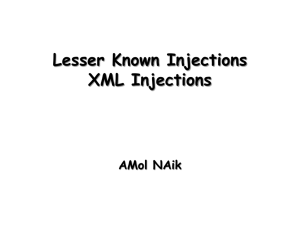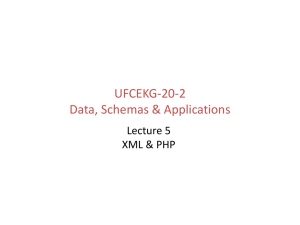Slides
advertisement
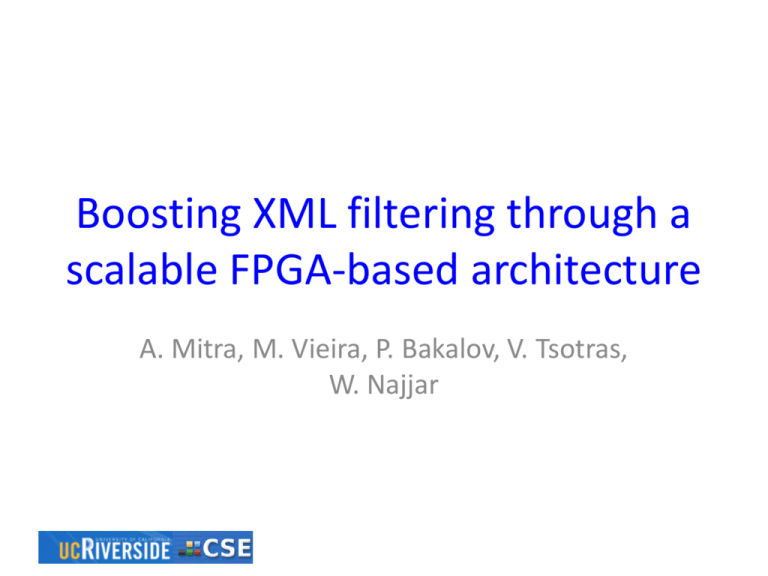
Boosting XML filtering through a scalable FPGA-based architecture A. Mitra, M. Vieira, P. Bakalov, V. Tsotras, W. Najjar XML Pub-Sub • XML Document is published on a server e.g. News, Archived papers, etc. • Thousands of Content subscribers access the published document • Each subscriber query constitutes an XPATH expression • We implement XPATH expressions as regular expressions on FPGA XML Pub Sub XML Publisher’s Document Stream XML Data Query 1 Query 2 Query 3 Query n Sub 1 Sub 2 Sub 3 Sub n To Individual Subscribers through Internet Two important XPATH expressions // and / The '//' operator selects all descendants matching a Tag. The '/' operator selects all children matching a Tag. <b> is a child of <a> thus a//b and a/b both will return true <g> is a descendant of <a>, thus a/g will return FALSE, while a//g will return true <a> <b> <c> <e> <d> <f> <g> Pub-Sub Implementation on FPGA XPATH Queries XPATH to PCRE Regex FPGA Bitstream 1 FPGA Bitstream 2 FPGA Bitstream n TAG Replacement Congregation With SGI-RASC Core Services Common Prefix Optimization Area Analysis FPGA Tool Flow Section REGEX To VHDL Compiler Synthesis, Place and Route Pub Sub on FPGA • XPATH expressions are converted to Regular expression hardware using our PCRE based compiler • The tag names are replaced with 32-bit hardware alias tags in the XPATH and also in published XML document – for e.g. <index> is replaced with <a0>, <book_chapter> with <a1>, etc. • Expression with // (Ancestor Descendant) operator can be directly implemented as a regex • Expressions with / (Parent Child) operator are subsequently modified to use a hardware tag-Stack to verify parent-child relationship. • All the XPATH expressions are common prefix optimized Internal block diagram of XPATH a0//b0 en match en <a0> match <b0> en match </a0> Streaming XML Character Input XPATH Expression: a0//b0 •The above block diagram implements a regular expression in hardware • The regex <a0> [\w\s]+ [<\c\d>|</\c\d>]* <b0> would match the XPATH a0//b0. •\w is a short form for any character or number, \s is for blank space, \d is for number, \c is for any lowercase character •The last block </a0> is added as an additional check to verify <b0> was matched before <a0> closed. <b0> & !</a0> Internal block diagram of XPATH a0/b0 en en match <a0> match en <b0> <b0> & !</a0> & match </a0> Streaming XML Character Input TOS=<a0 > en match <a0> TOS push Tag filter pop XPATH Expression: a0/b0 <TAG> TOS Tag Input TAG STACK on (BRAM) Prüfer Sequence Generator and Matching Hardware Streaming XML Character Input Q <TAG> Node0 pop push Character Decoder Leaf (push then pop) TOS TOS - 1 bc en b 0 en Node1 / 0 1 … p u s h a Character Decoder Tag filter < > … A B … a b … / 0 1 … p u s h < > … A B … a b … 0 en a 0 c 0 en aa 0 Twig Pattern: a0[b0]/c0 match match match match Subsequence Match Output Overall organization 8 XML Document Stream Character Pre - Decoder XPATHs with STACK XPATHs without STACK XPATH XPATH XPATH XPATH XPATH XPATH XPATH XPATH XPATH XPATH XPATH XPATH XPATH BRAM Stack XPATH XPATH XPATH Output Priority Encoder 0 2 Output Priority Encoder 1 XML Query Data / Output 4 Prüfer Sequence Generator and Matching Hardware Streaming XML Character Input TOS 1 TOS-1 0 TOS - 1 b p u s h c < > … A B … a b … / 0 1 … p u s h Character Decoder push TOS / 0 1 … Character Decoder pop Character Decoder Leaf (push then pop) < > … A B … a b … 0 / 0 1 … p u s h < > … A B … a b … a en TOS-1 1 Character Decoder TOS 0 <TAG> Tag filter / 0 1 … p u s h < > … A B … a b … 0 en b 0 a 0 c 0 a Twig Pattern: a0[b0]/c0 match match 0 8-bit ASCII Stream 8 Character Decoder 1-bit x 4 Character Pre-Decoder Match Block / 0 1 … Hardware for tag <a0> 1 1 0 < < > … A B a … a b … 1 1 One of the 256 1-bit output is active each clock cycle. > 8bit x 4 Character Match Block < 8-bit ASCII Stream 8 a 0 > XPATH a0/b0 • The block diagram implements a regular expression with added stack control in hardware • The modified regex • <a0> [\w\s]+ [<\c\d>|</\c\d>]*[Stack1] <b0> would match the XPATH a0/b0. • The added modifier Stack1 would direct the compiler to introduce a match block that would match the Top of stack (TOS) to <a0> when, tag <b0> is encountered in the document. • The tag filter runs in parallel to the regexes and pushes a open tag onto the TOS, and if it encountered a close tag it would pop out the TOS XPATH Expressions on FPGA • We compile multiple XPATH expressions to Regular expressions and the [Stack] label is added to the XPATHs with / operator • We utilize common prefix optimization on the regexes • Thereafter the regexes are converted to VHDL • We have two sets of priority encoder, one for the XPATH expressions which require stack and the other for the rest of XPATH expressions. HW Performance (XPATHs with 2 Tags) v i r t e x 4 20000 SLICES (common prefix) 18000 16000 13170 14000 12000 10000 8626 8000 6388 6000 S L I C E S 4000 2000 315 560 742 1120 1353 2193 4338 2764 0 16 32 64 128 256 512 Number of XPATH queries with 2 TAGS 250 236 227 200 Clock MHz 17220 SLICES Unoptimized MHz (Common Prefix) 217 MHz (Unoptimized) 211 221 191 150 148 184 173 148 137 139 100 50 0 16 32 64 128 256 Number of XPATH queries with 2 TAGS 512 HW Performance (XPATHs with 4 Tags) v i r t e x 40000 SLICES (common prefix) 35000 30000 25000 22180 19092 20000 4 15000 11642 10000 S L I C E S 5000 679 920 12301934 2406 4023 8083 5700 0 16 32 64 128 256 512 Number of XPATH queries with 4 TAGS MHz (Common Prefix) 300 250 Clock MHz 33713 SLICES Unoptimized 200 MHz (Unoptimized) 240 172 200 175 169 150 158 127 153 149 132 122 101 100 50 0 16 32 64 128 256 Number of XPATH queries with 4 TAGS 512 HW Performance (XPATHs with 6 Tags) V i r t e x 4 60000 SLICES (common prefix) 51605 50000 SLICES Unoptimized 40000 31563 30000 26160 18688 20000 S L I C E S 10000 10291653 19413286 16 32 6388 4354 10415 8700 0 64 128 256 512 Number of XPATH queries with 6 TAGS 250 222 208 200 MHz (Common… 208 Clock MHz 164 150 148 124 159 127 120 109 100 109 68 50 0 16 32 64 128 Number of XPATH queries with 6 TAGS 256 512 SW Performance • Using Yfilter Common Prefix Optimized NFA approach – The XPATH expressions consists of queries generated with Toxgene – Queries are a equal mix of 2, 4, and 6 Tags – Throughput for Parsing XML data using Yfilter from 512 XPATH expressions on a Pentium-4 Machine is = 2.4MBytes / sec – Tested SW Throughput is nearly constant for input data size ranging from 1 MB up until 1 GB. Comparison of Performance • Common Prefix Optimized HW – 2 Tags 512 XPATH Expressions = 139 MBytes/s – 4 Tags 512 XPATH Expressions = 101 MBytes/s – 6 Tags 512 XPATH Expressions = 68 MBytes/s • Common Prefix Optimized SW Yfilter – Yfilter 512 XPATH Expressions = 2.4 MBytes/s Performance • Performance Gain using a single FPGA (critical path) – (68MBytes/s) / (2.4 MBytes/s) = 28.3X • Performance Gain using SGI RASC Blade (66MHz) – (66MBytes/s) / (2.4MBytes/s) = 27.5X Linear Prüfer Sequence Generator
